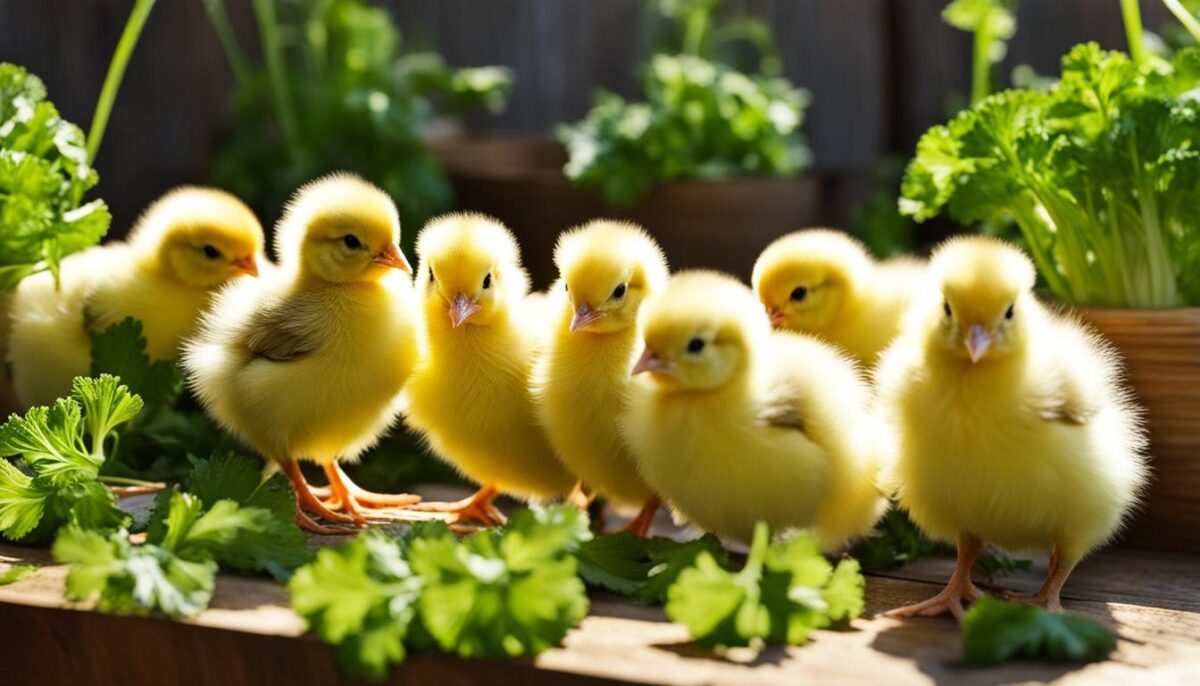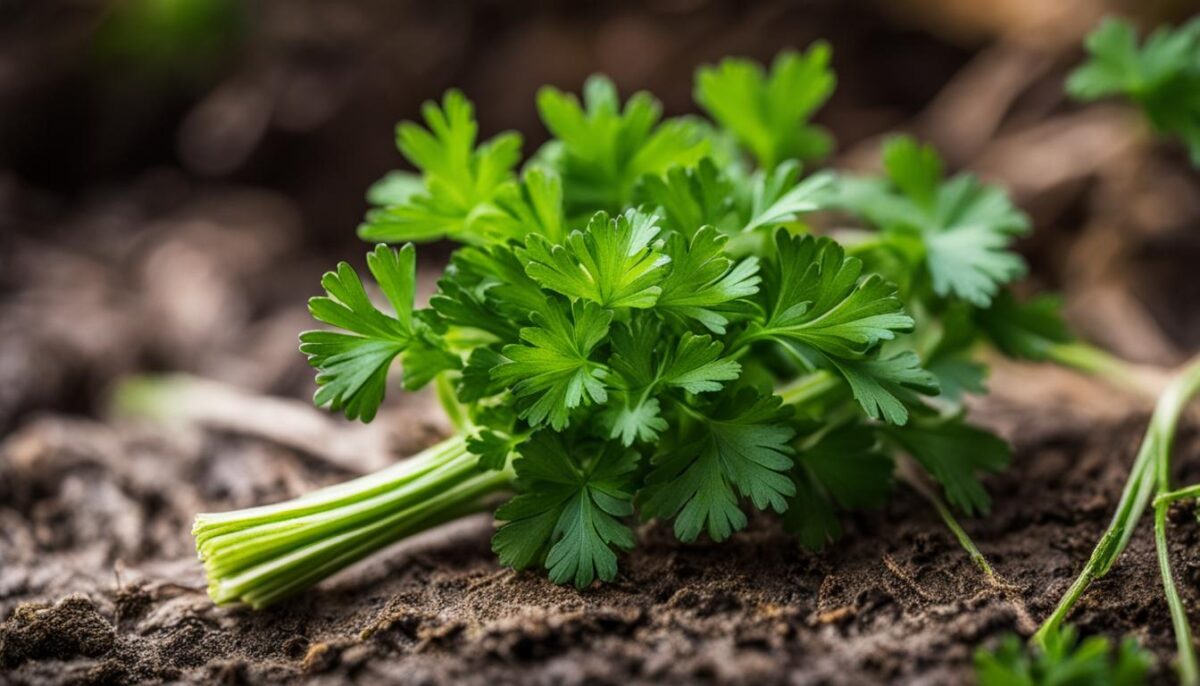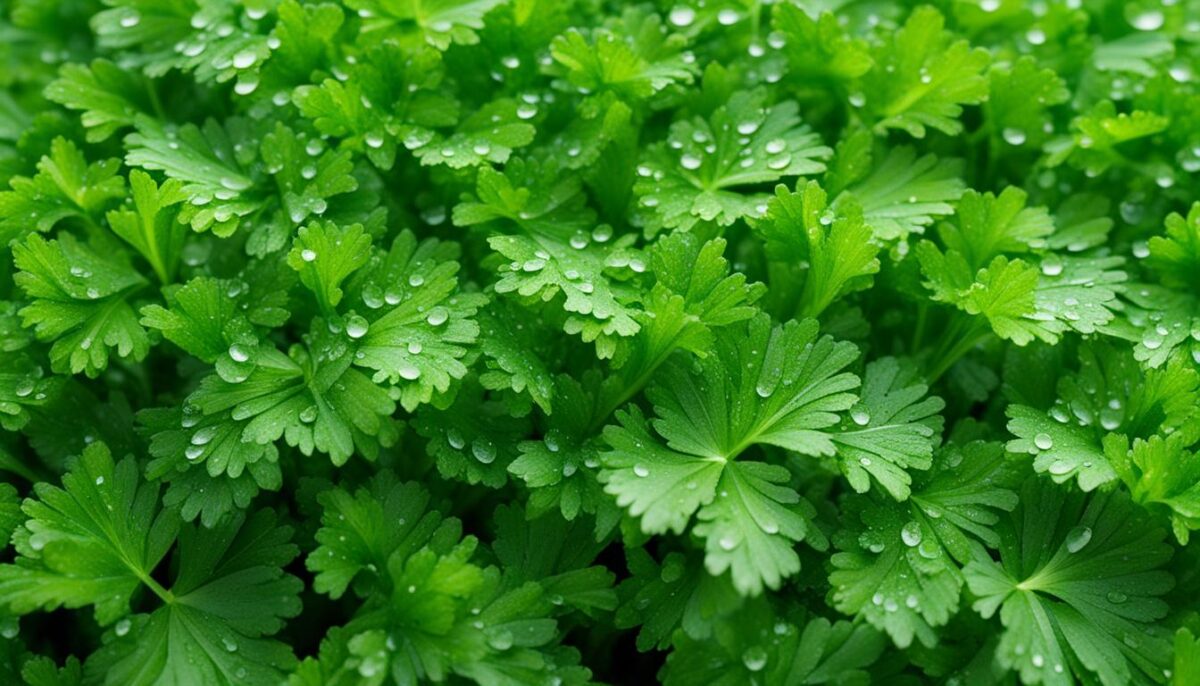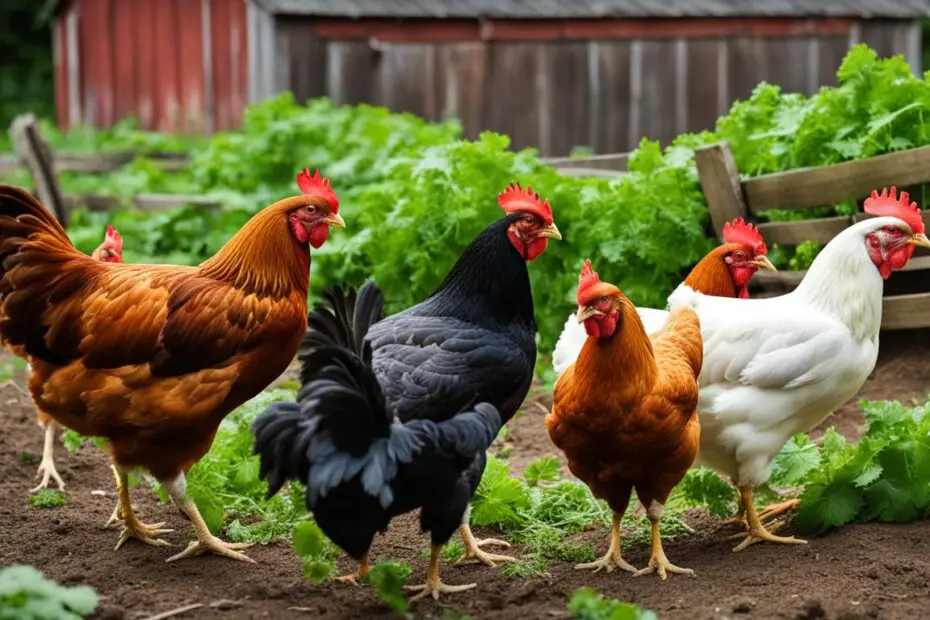Are you curious about whether chickens can enjoy the delicious and nutritious herb, parsley? Well, you’ve come to the right place! In this article, we will explore the topic of feeding parsley to chickens and uncover the facts surrounding its benefits as a chicken treat. So, let’s dive in and discover if backyard chickens can indulge in this herbaceous delight!
Key Takeaways:
- Parsley is safe and healthy for chickens, offering them a range of vitamins, minerals, and antioxidants.
- Feeding parsley to chickens should be done in moderation and it’s essential to ensure the parsley is pesticide-free.
- Parsley can benefit a chicken’s immune system, respiratory health, and overall well-being.
- It’s important to provide a balanced diet for chickens, including high-quality feed, supplements, and access to fresh grass and insects.
- Introduce parsley gradually to baby chicks and monitor their reaction to ensure their digestive systems can handle it.
Can Chickens Eat Parsley
Ways to Make Money by Chicken Farming
The Proper Diet for Chickens
Providing chickens with a proper diet is essential for their health. While commercial chicken feed is a popular choice, it is important to consider the ingredients and quality of the feed. Many chicken owners opt for organic, non-medicated feed that is free from additives and harmful chemicals. Organic chicken feed ensures that the chickens are not exposed to pesticides or antibiotics that may compromise their immune system or overall well-being. can chickens eat parsley
In addition to feeding organic chicken feed, allowing chickens to free-range on grass and bugs can provide them with a more natural and balanced diet. Free-ranging chickens have the opportunity to peck at the ground, forage for insects, and eat a variety of vegetation. This not only provides them with additional nutrients but also enriches their environment and encourages natural behaviors.
Supplementing the chicken’s diet with kitchen scraps and garden produce is another way to provide them with a diverse range of nutrients. However, it is important to avoid feeding them harmful foods such as chocolate, caffeine, onions, and garlic, which can be toxic to chickens. It’s best to research and consult with a veterinarian or poultry expert to ensure that all foods offered to chickens are safe and appropriate for their diet.
| Commercial Chicken Feed | Free-Range Diet | Supplementing with Kitchen Scraps |
|---|---|---|
| Provides balanced nutrition | Natural foraging behavior | Diverse range of nutrients |
| May contain additives or chemicals | Access to grass, bugs, and vegetation | Avoid toxic foods |
| Convenient and readily available | Aids in digestion and reduces boredom | Research and consult for safe options |
By providing a proper diet consisting of organic chicken feed, access to free-ranging opportunities, and supplementing with kitchen scraps, chicken owners can ensure that their feathered friends are well-nourished and thriving.
Supplements for Chickens
Providing your chickens with the right supplements can significantly enhance their overall health and well-being. Organic supplements for chickens can act as immune boosters, improve digestion, promote healthy feather growth, and provide essential nutrients. Adding these supplements to their diet can help maintain their optimal health and support their natural immune system. is parsley safe for chickens
When choosing chicken supplements, it is important to opt for organic options that are free from additives, chemicals, and genetically modified organisms. Organic supplements ensure that your chickens are receiving high-quality ingredients without the risk of harmful substances. Additionally, following the recommended dosage guidelines is crucial to avoid over-supplementation and potential health issues. health benefits of parsley for chickens
| Supplement | Benefits |
|---|---|
| Coop Kelp | Rich in essential minerals, supports immune health |
| Brewer’s Yeast | Improves feather appearance, aids digestion |
| Cluckin’ Good Herbs | Enhances overall health and well-being |
| Oyster Shell | Provides calcium for strong eggshells |
Remember that supplements should be used as a complement to a well-balanced diet, which includes high-quality chicken feed and access to fresh greens, bugs, and a clean water source. Regularly assessing your chickens’ health and consulting with a veterinarian or poultry expert can help you determine the best supplements and dosage for your flock.
Benefits of Parsley for Chickens
Parsley offers a range of health benefits for chickens, making it a valuable addition to their diet. This herb is rich in essential vitamins and minerals, including vitamins A, C, and K, as well as iron and calcium. By incorporating parsley into their meals, chickens can experience improved immune system function, enhanced respiratory health, and even better egg quality. parsley as a chicken treat
One of the key advantages of parsley for chickens is its ability to boost their immune system. The vitamins and antioxidants found in parsley can strengthen their natural defenses and help them fight off diseases and infections. Additionally, parsley’s anti-inflammatory properties can support respiratory health in chickens, keeping their airways clear and reducing the risk of respiratory issues.
In addition to promoting overall health, parsley can also contribute to better egg quality. Chickens that consume parsley may produce eggs with a richer taste and vibrant yolk color. This herb’s high vitamin and mineral content can enhance the nutritional profile of the eggs, providing added benefits for those who enjoy farm-fresh eggs. can backyard chickens eat parsley
It’s important to note that while parsley is safe for chickens, it should be fed in moderation. Too much parsley can lead to digestive upset in chickens, so it’s best to introduce it gradually and monitor their response. Additionally, always ensure that the parsley is fresh and free from pesticides to avoid any potential harm to the chickens.
Table: Nutritional Content of Parsley
| Nutrient | Amount per 100g |
|---|---|
| Vitamin A | 4210 IU |
| Vitamin C | 133 mg |
| Vitamin K | 1640 mcg |
| Iron | 6.2 mg |
| Calcium | 138 mg |
Table: Nutritional Content of Parsley
Source: USDA National Nutrient Database
Feeding Parsley to Baby Chicks
Introducing parsley to young chickens can be a nutritious addition to their diet, but it’s important to do so gradually and in moderation. Baby chicks should be at least two weeks old before you start offering them parsley. Start by finely chopping the parsley and mixing it into their regular chick starter feed. Monitor their reaction and gradually increase the amount of parsley as they grow. This slow introduction allows their digestive systems to adjust and ensures they can handle new foods without any issues. fresh herbs for chickens
Parsley provides many health benefits for baby chicks. It is rich in vitamins, minerals, and antioxidants that support their overall well-being. However, it’s crucial to remember that a balanced diet is key. Along with parsley, baby chicks should still receive their regular chick starter feed, which provides essential nutrients for their growth and development. parsley in chicken diet
By adding parsley to their diet, baby chicks can enjoy the natural goodness of this herb. Its vitamins and minerals can help support their immune system, while the antioxidants contribute to their overall health. Remember to observe your chicks closely as you introduce parsley and adjust the amount according to their individual needs.
Feeding Parsley to Baby Chicks – Dos and Don’ts
- Gradually introduce parsley to baby chicks after they reach two weeks of age.
- Start with small amounts of finely chopped parsley mixed into their regular chick starter feed.
- Monitor their reaction and gradually increase the amount of parsley as they grow.
- Ensure that their regular chick starter feed remains the main source of nutrition.
- Observe your chicks closely for any signs of digestive issues or adverse reactions.
- Consult a veterinarian if you have any concerns or questions about feeding parsley to your baby chicks.
| Parsley for Baby Chicks | Benefits |
|---|---|
| Rich in vitamins and minerals | Supports immune system health |
| Packed with antioxidants | Contributes to overall well-being |
| Gradual introduction is important | Monitor chicks’ reaction and adjust accordingly |

“Introducing parsley to baby chicks can provide them with additional health benefits. Gradually increasing the amount and monitoring their reaction is crucial to ensure their well-being and digestive health.” – Expert Chicken Farmer
Other Herbs for Chickens
In addition to parsley, there are several other safe and healthy herbs that can benefit chickens. Adding a variety of herbs to a chicken’s diet not only provides them with essential nutrients but also adds flavor and enrichment to their meals. Here are some herbs that you can consider incorporating into your chicken’s diet:
- Cilantro: Rich in antioxidants and vitamins, cilantro can help support your chicken’s immune system and promote digestive health.
- Basil: Known for its antibacterial and anti-inflammatory properties, basil can contribute to overall chicken health and well-being.
- Rosemary: Aromatic and packed with antioxidants, rosemary can boost your chicken’s respiratory health while adding a delightful fragrance to their diet.
- Mint: Offering a refreshing taste, mint can aid in digestion and provide a cooling effect during hot weather.
These herbs can be fed to chickens in small amounts, either fresh or dried. You can mix them into their feed, sprinkle them in their coop or run, or even hang fresh herb bundles for them to peck at. Remember to introduce new herbs gradually and monitor your chickens’ response to ensure they tolerate them well.
By offering a variety of herbs, you not only provide your chickens with a diverse and nutritious diet but also add enrichment to their daily routine. Just like humans, chickens can benefit from a well-rounded diet that includes different flavors and textures. So go ahead and explore the world of herbs for your feathered friends!
Table: Comparison of Herbs for Chickens
| Herb | Nutritional Benefits | Health Benefits | Usage |
|---|---|---|---|
| Cilantro | Vitamins, antioxidants | Immune support, digestive health | Mixed with feed, sprinkled in coop |
| Basil | Antibacterial properties | Anti-inflammatory, overall health | Mixed with feed, fresh or dried |
| Rosemary | Antioxidants | Respiratory health, fragrance | Mixed with feed, hung as fresh bundles |
| Mint | Refreshing taste | Digestive aid, cooling effect | Mixed with feed, fresh or dried |
As you can see from the table, each herb offers unique nutritional and health benefits for your chickens. Incorporating a variety of these herbs into their diet can provide a well-rounded and flavorful meal experience. Remember to always choose fresh, high-quality herbs and introduce them gradually to ensure your chickens enjoy the full benefits of these natural additions to their diet.
Common Pests and Concerns
When it comes to growing parsley, there are a few common pests that can pose a threat to your plants. These pests include leafminers, caterpillars, slugs, and earwigs. Leafminers are tiny flies whose larvae feed on parsley leaves, leaving behind tunnel-like trails. Caterpillars, such as the parsley worm, can also devour the foliage of parsley plants. Slugs are notorious for their love of leafy greens and can quickly decimate your parsley crop. Lastly, earwigs are nocturnal insects that feed on plant material and can cause damage to parsley leaves.
To prevent and protect your parsley from these pests, there are several strategies you can employ. Firstly, consider using organic pest control methods such as traps and baits. These can help reduce the population of pests in your garden. Additionally, introducing natural predators like ladybugs or lacewings can help keep pest numbers in check. Creating a barrier around your parsley plants, such as a net or fence, can also prevent pests from accessing them. Lastly, it’s important to ensure that your parsley plants are of high quality and free from pesticides, as this can deter pests from infesting them.
By taking these precautions and implementing pest control measures, you can successfully protect your parsley plants from common pests. This will ensure that you have a healthy and thriving crop of parsley to feed to your chickens.
| Pest | Description | Prevention |
|---|---|---|
| Leafminers | Tiny flies whose larvae feed on parsley leaves, leaving tunnel-like trails. | Use sticky traps or yellow sticky cards to catch adult flies. Remove and destroy affected leaves. |
| Caterpillars | Insects that can devour the foliage of parsley plants, such as the parsley worm. | Handpick caterpillars from plants. Introduce natural predators like ladybugs or birds. |
| Slugs | Mollusks that feed on leafy greens, including parsley. | Place copper tape or diatomaceous earth around plants. Set up beer traps to attract and drown slugs. |
| Earwigs | Nocturnal insects that can cause damage to parsley leaves. | Provide hiding spots like upturned pots or rolled damp newspaper to trap and remove earwigs. |
Pest Prevention Tips
- Inspect your parsley plants regularly for signs of pest infestation.
- Remove any affected leaves or pests manually.
- Introduce natural predators like ladybugs, lacewings, or birds.
- Create physical barriers around your plants, such as nets or fences.
- Use organic pest control methods like traps, baits, or natural deterrents.
By implementing these pest prevention strategies, you can ensure that your parsley plants remain healthy and free from infestations. This will not only protect your crop but also provide you with pesticide-free parsley to feed to your chickens.

Parsley as a Human and Animal Food
While parsley is commonly used as a garnish in human cuisine, it can also be consumed as part of a healthy diet. However, it is important to consume parsley in moderation, as excessive intake can lead to health issues in some individuals. Parsley contains compounds called oxalates, which can contribute to the formation of kidney stones when consumed in large amounts. Therefore, individuals with existing kidney problems or a history of kidney stone formation should exercise caution when consuming parsley.
Animals, on the other hand, can also enjoy the benefits of parsley. Various animals, such as rabbits, deer, and certain insects, may eat parsley leaves as part of their natural diet. However, it is crucial to prevent overfeeding and ensure that the parsley plants are not contaminated with harmful substances. Ingesting pesticides or other toxins can be detrimental to the health of these animals.
“Parsley, when consumed in moderation, can be a nutritious addition to human and animal diets. However, it is important to be mindful of individual health conditions and to provide clean, pesticide-free parsley to animals.”
Animals that Eat Parsley Leaves
Many animals are attracted to the taste and nutritional value of parsley leaves. Rabbits, in particular, are known to enjoy parsley as part of their diet. The high fiber content of parsley can aid in digestion and promote overall gut health in rabbits. However, similar to humans, rabbits should consume parsley in moderation to avoid any potential health issues.
| Animal | Dietary Preference |
|---|---|
| Rabbits | Parsley leaves can be a tasty addition to their diet, but should be fed in moderation. |
| Deer | Deer may graze on parsley leaves if they are available in their natural environment. |
| Insects | Various insects, such as caterpillars and beetles, may feed on parsley leaves as part of their natural diet. |
When feeding parsley to pets or wild animals, it is important to ensure that the parsley is fresh, clean, and free from any pesticides or contaminants. Always consult with a veterinarian or wildlife expert for specific dietary recommendations for your pets or local wildlife.

Conclusion
In conclusion, parsley is a safe and nutritious herb that can be a valuable addition to a chicken’s diet. Feeding parsley to chickens in moderation can provide numerous benefits to their health and well-being. This herb is packed with essential vitamins, minerals, and antioxidants that support their immune system, respiratory health, and overall vitality.
By incorporating parsley into a chicken’s diet, owners can enhance the taste of eggs and promote natural pest control. However, it is important to introduce parsley gradually and monitor their response to ensure their digestive systems can handle it. Additionally, ensuring that parsley is pesticide-free and of high quality is crucial to reducing the risk of pest infestation and contamination.
Providing a balanced diet for chickens, including high-quality feed, supplements, and access to fresh grass and insects, is essential for their optimal health. Parsley, alongside other herbs, can contribute to their overall well-being. By following these guidelines and offering parsley in moderation, owners can safely provide their chickens with the many benefits of this nutritious herb.
FAQ
Can chickens eat parsley?
Yes, parsley is safe and healthy for chickens to eat. It offers several benefits for their overall health and well-being.
How can parsley benefit chickens?
Parsley is packed with vitamins, minerals, and antioxidants that can boost the immune system, support respiratory health, act as a natural pest control, and enhance the taste of eggs.
Should parsley be introduced gradually to baby chicks?
Yes, it is important to introduce parsley to baby chicks gradually and in small quantities. Wait until the chicks are at least two weeks old and start with finely chopped parsley mixed into their regular chick starter feed.
Are there other herbs that are safe for chickens?
Yes, other safe and healthy herbs for chickens include cilantro, basil, rosemary, mint, and parsley. It is recommended to rotate herbs and provide variety in a chicken’s diet.
How can I protect parsley from pests?
Parsley can be susceptible to pests such as leafminers, caterpillars, slugs, and earwigs. Using organic pest control methods, creating a barrier around parsley plants, and ensuring high-quality and pesticide-free plants can help prevent pests.
Is parsley safe for other animals?
Yes, parsley is commonly used as a garnish in human cuisine and is safe for consumption. Some animals, such as rabbits, deer, and various insects, also enjoy eating parsley leaves. Care should be taken to prevent overfeeding and ensure that the parsley is not contaminated with harmful substances.


